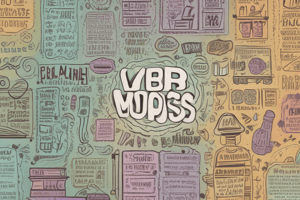Podcast
Questions and Answers
The verb 'to be' can be used to express existence, location, and ______.
The verb 'to be' can be used to express existence, location, and ______.
True (A)
Negative forms of the 'to be' verb are created by adding 'no' after the verb.
Negative forms of the 'to be' verb are created by adding 'no' after the verb.
False (B)
In the sentence 'They are excited', 'they' is the subject and 'are' is the verb.
In the sentence 'They are excited', 'they' is the subject and 'are' is the verb.
True (A)
The question form of 'to be' requires the verb to be placed after the subject.
The question form of 'to be' requires the verb to be placed after the subject.
All languages have a verb that serves the same function as 'to be'.
All languages have a verb that serves the same function as 'to be'.
Flashcards
To be verb
To be verb
A verb that describes existence, location, and possession.
Forms of 'to be'
Forms of 'to be'
Conjugated forms: I am, You are, He/She/It is, We are, They are.
Negative forms
Negative forms
Adding 'not' to express negation with the 'to be' verb.
Question forms
Question forms
Signup and view all the flashcards
Simple sentences
Simple sentences
Signup and view all the flashcards
Study Notes
"To Be" Sentences (Beginner Level)
- "To be" is a verb describing the state of being.
- Its conjugated forms express existence, location, and possession.
- Common forms include:
- I am
- You are
- He/She/It is
- We are
- They are
- These forms are essential for simple sentence construction.
- Knowing the "to be" verb helps beginners form daily conversation sentences.
- Many languages have a similar "to be" verb.
Examples of Sentences
- I am happy.
- You are a student.
- He is tall.
- She is a teacher.
- It is a book.
- We are friends.
- They are going to the park.
- I am learning English.
- You are playing.
- He is reading a book.
- She is writing a letter.
- It is cold outside.
- We are eating pizza.
- They are playing soccer.
- I am at the library.
- You are in the classroom.
- He is on the bus.
- She is in the park.
- It is on the table.
- We are at home.
- They are at school.
- I am from America.
- You are from England.
- He is from Japan.
- She is from France.
- It is red.
- We are tired.
- They are excited.
Negative Forms
- Negation is created by adding "not" to the "to be" verb.
- Negative forms are useful for contrasting or expressing absence.
Question Forms
- Questions use the verb before the subject (e.g., "Are you happy?" instead of "You are happy").
- Questions require a positive or negative response.
Studying That Suits You
Use AI to generate personalized quizzes and flashcards to suit your learning preferences.




